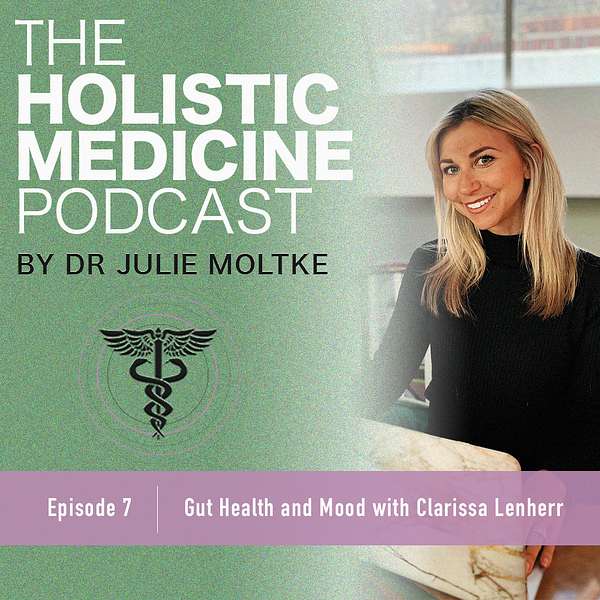
The Holistic Medicine Podcast by Dr Julie Moltke
The Holistic Medicine Podcast by Dr Julie Moltke
E7 The relationship between gut health, mood and mental health with nutritionist Clarissa Lenherr
Clarissa Lenherr is a Harley Street registered nutritionist and leading workplace wellbeing consultant. As a private nutritionist, Clarissa has helped hundreds of clients back to optimal health and she specialises in digestive health, auto-immune conditions, and hormone health. Her mission is to take the science of nutrition and convert it into easy to implement strategies so that her clients can achieve ultimate wellbeing.
4:30 - What is the enteric nervous system: the connection of nerve fibers in the gut is called the enteric nervous system (ENS) and it is sometimes called the second brain.
8:10 - The brain-gut connection: There is a bidirectional link between the central nervous system and the enteric nervous system in the gut.
12:50: The microbiome is a collection of bacteria that live in our gut. Some of them produce neurotransmitters including serotonin, GABA, and dopamine. 95% of serotonin, one of the most important hormones for mental health, is made in the gut. 70% of the immune system is in the gut which is why an unhealthy gut is often associated with poor immune health, autoimmune disease, and inflammation.
15:10 - Can stress, anxiety, and mental health disorders originate from the gut?
18:30 - How can we use nutrition to improve gut health and mood? Disclaimer: if you have a preexisting medical concern you should see a doctor or nutritionist
Tips to improve gut health and mood
- 30 grams of fiber per day (The average consumes only eats 18 grams) - It benefits digestive health, heart, and liver health. It feeds the good bacteria and can improve constipation dominant IBS.
- Prebiotic fibers are insoluble and they are hard to break down in the gut. It moves whole to the large intestine where the gut-bacteria eat them and produce by-products including short-chained fatty-acids (SCFA).
- Some prebiotic foods are: Artichokes, Asparagus, bananas, barley, berries, chicory, garlic, green vegetables
- Probiotics: food or supplements containing live-bacteria to support our microbiome. They can be found in fermented food like kefir and live yogurt, kombucha, sauerkraut and kimchi, tempeh, and soy. Can be used 3 times/week. Or take probiotics in supplement form.
- Start low and go slow: Too many fibers and probiotics can cause bloating and diarrhea so start slowly when increasing fiber intake.
- Red wine can be good for the microbiome in small quantities
Stay away from:
- Processed meats and processed food
- Contains lots of nitrate and unhealthy fats
- Sweeteners have been shown to reduce the diversity in the microbiome
- Stay away from chewing gum which contains a lot of sweeteners
- Be cautious with caffeine which can cause bloating and diarrhea
- Alcohol affects our absorption of nutritions and our mood and sleep.
- Refined sugar - less than 30 grams per day
30:20: Can food reduce symptoms of anxiety and stress? Simple diet changes to a whole-food, high in fruits and vegetables. Nutrients to support mental health:
- Omega-3: From fatty-fish like salmon and mackerel, chia seeds and walnuts
- Vitamin-3: diary milk-foods, eggs, mushrooms, and from the sunshine. As a supplement - recommended dose: 25-50 microgram/day.
35:10 Is intermittent-fasting good for gut-health and mood? Fasting can help the digestive system to fully clear out and reset.
Tips: Have 12-16 hours fasting period overnight (start low and go slow)
- 4-hour gaps between meals
- Reduce snacking (not for people with diabetes, pregnancy, or high-stress levels)
- You can have water, tea or black coffee
- Eat a balanced diet in the 8 hours - eat the colors of the rainbow, hydrate, and drink lots of water